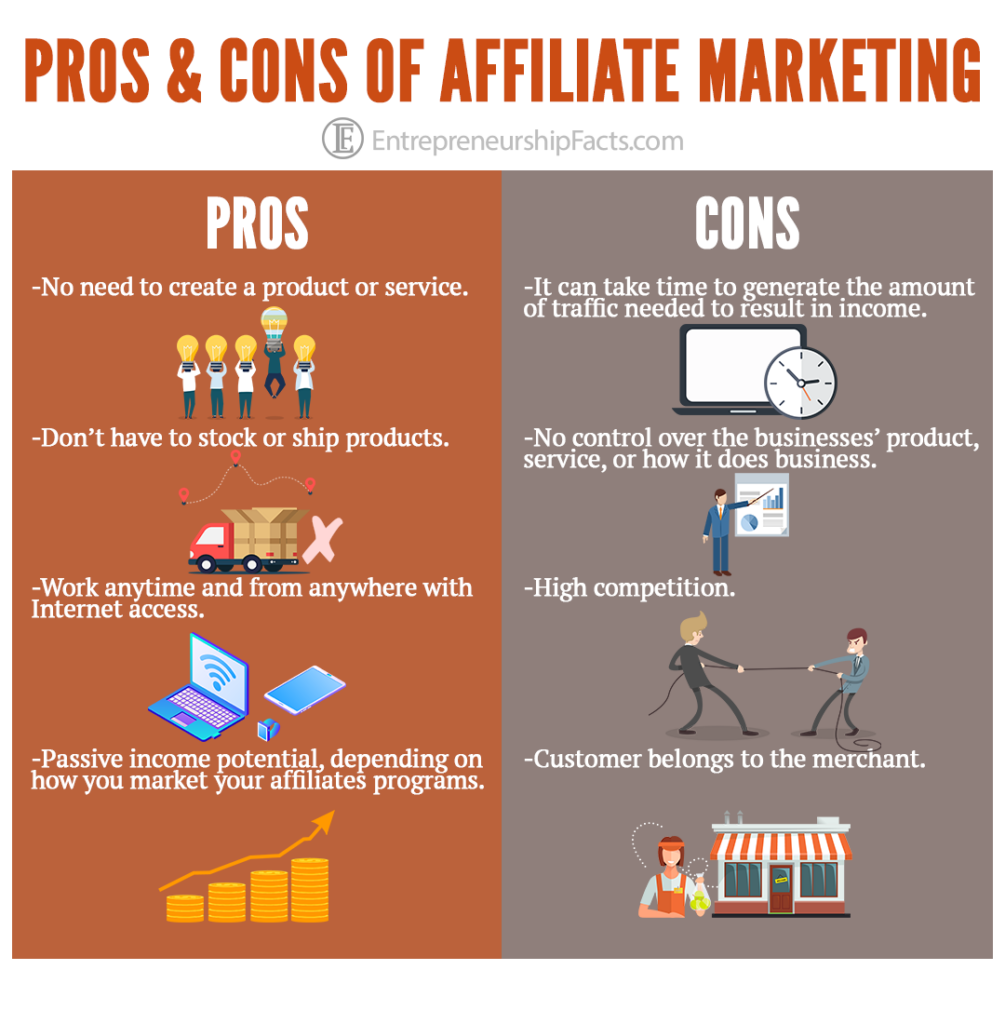Many people might wonder this question when considering venturing into affiliate marketing. In this article, you’ll learn about the challenges and rewards of affiliate marketing, as well as some strategies and tips to increase your chances of success. Whether you’re a beginner or already involved in affiliate marketing, this article aims to provide valuable insights and guidance on the path towards success. So, let’s explore the world of affiliate marketing together and discover how you can achieve your goals in this dynamic industry.

What is Affiliate Marketing?
Definition of Affiliate Marketing
Affiliate marketing is a performance-based marketing strategy where an individual or a company (the affiliate) promotes products or services on behalf of another company (the merchant). The affiliate earns a commission for every sale or lead generated through their promotional efforts.
How Affiliate Marketing Works
Affiliate marketing operates through an affiliate network or a merchant’s own affiliate program. The affiliate signs up with the network or program, selects the products or services to promote, and receives a unique tracking link. This link is used to track the referrals and sales generated by the affiliate. When a potential customer clicks on the affiliate’s link and makes a purchase, the affiliate is credited with a commission.
Benefits of Affiliate Marketing
There are several benefits to engaging in affiliate marketing:
-
Low startup costs: Affiliate marketing allows individuals to start their own business with minimal investment. There is no need to create products, handle inventory, or deal with customer support.
-
Passive income potential: Once the initial setup is complete, affiliate marketers can earn passive income by promoting products or services. As long as there is a steady stream of traffic and conversions, the affiliate can continue to earn commissions.
-
Flexibility: Affiliate marketing offers the freedom to work from anywhere, as long as there is an internet connection. It provides the opportunity to be your own boss and set your own schedule.
-
No customer support required: affiliates do not have to deal with customer inquiries or support. All customer service matters are handled by the merchant.
The Factors That Make Affiliate Marketing Challenging
High Competition
One of the challenges in affiliate marketing is the high level of competition. With the increasing popularity of the industry, more and more individuals and companies are entering the market, making it difficult to stand out from the crowd. It requires innovative strategies, unique content, and exceptional marketing skills to gain a competitive edge.
Constantly Changing Landscape
The affiliate marketing landscape is constantly evolving. New technologies, platforms, and trends emerge, requiring affiliates to stay updated and adapt their strategies accordingly. What may be effective today may not work tomorrow, making it crucial to always be on top of industry changes and adjust marketing efforts accordingly.
Building a Trustworthy Brand
Establishing a trustworthy brand is essential for affiliate marketers to gain the trust and loyalty of their audience. However, building a brand takes time and consistent effort. Affiliates need to consistently provide high-quality content, offer valuable recommendations, and maintain transparent and honest communication with their audience. Building trust is not easy and can be a significant challenge for affiliate marketers.
Skills and Knowledge Required for Affiliate Marketing Success
Understanding the Target Audience
To be successful in affiliate marketing, it is crucial to understand the target audience. Affiliates must identify their audience’s needs, desires, and pain points in order to effectively promote products or services. By understanding their audience, affiliates can create content that resonates with them and provides genuine value.
Expertise in Marketing Strategies
Successful affiliate marketers possess a deep knowledge of various marketing strategies. They understand the importance of search engine optimization (SEO), social media marketing, content marketing, and email marketing. By combining these strategies, affiliates can effectively promote products and drive traffic to their affiliate links.
Effective Communication Skills
Communication skills play a vital role in affiliate marketing success. Affiliates need to effectively communicate with their audience through various channels, including email, social media, and website content. Clear and concise communication helps affiliates build trust and establish themselves as credible sources of information and recommendations.
Building a Successful Affiliate Marketing Strategy
Choosing the Right Niche
Selecting the right niche is crucial in affiliate marketing. Affiliates should choose a niche they are passionate about and have knowledge in. By focusing on a specific niche, affiliates can establish themselves as experts and build a loyal following within that niche.
Selecting Profitable Affiliate Programs
affiliate programs vary in terms of commission rates, product quality, and support. It is important for affiliates to carefully evaluate different affiliate programs and select those that offer high-quality products and fair commission rates. Developing relationships with reputable merchants can also lead to long-term partnerships and increased earning potential.
Creating Compelling Content
Compelling content is the backbone of successful affiliate marketing. Affiliates need to create content that engages, educates, and persuades their audience. This can include informative articles, reviews, tutorials, and videos. The content should be tailored to the target audience and provide valuable insights and recommendations.

Types of Affiliate Marketing Techniques
Content-based Affiliate Marketing
Content-based affiliate marketing involves creating valuable content that promotes products or services. This can include blog posts, articles, videos, and podcasts. The content should be informative, engaging, and provide genuine value to the audience. By incorporating affiliate links within the content, affiliates can drive traffic and generate sales.
Email Marketing
Email marketing is an effective way for affiliates to connect with their audience and promote products. By building an email list, affiliates can send out newsletters, updates, and exclusive promotions. Email marketing allows for targeted and personalized communication, increasing the chances of conversions.
Social Media Marketing
Social media platforms provide a vast audience for affiliate marketers. By leveraging platforms such as Facebook, Instagram, Twitter, and YouTube, affiliates can reach a large and diverse audience. Social media allows for direct engagement with the audience, fostering relationships and promoting products or services.
Importance of Tracking and Analytics
Setting Up Tracking Systems
Tracking systems are essential for affiliate marketers to monitor the performance of their marketing efforts. By utilizing tracking tools, affiliates can track click-through rates, conversions, and sales. This data helps affiliates optimize their campaigns, identify areas for improvement, and measure the success of their marketing strategies.
Monitoring Key Performance Indicators
Key performance indicators (KPIs) provide valuable insights into the effectiveness of affiliate marketing campaigns. Affiliates should monitor KPIs such as conversion rates, average order value, and return on investment (ROI). By analyzing these metrics, affiliates can make data-driven decisions and adjust their strategies for improved performance.
Optimizing Marketing Campaigns
Tracking and analytics allow affiliates to optimize their marketing campaigns for maximum results. By analyzing data and identifying trends, affiliates can make informed decisions on which strategies to focus on. They can tweak their content, adjust their targeting, and refine their marketing messages to improve conversions and increase revenue.

Building Relationships with Affiliate Networks and Merchants
Finding Reliable Affiliate Networks
affiliate networks act as intermediaries between affiliates and merchants. It is important for affiliates to find reliable and reputable affiliate networks that provide high-quality products, fair commission rates, and reliable tracking systems. Establishing relationships with trustworthy affiliate networks can lead to better partnerships and increased earning potential.
Negotiating Commission Rates
Affiliates should not be afraid to negotiate commission rates with merchants. By showcasing their value and the potential benefits they can bring to the merchant’s business, affiliates can negotiate higher commission rates. However, it is important for affiliates to be realistic and fair in their negotiation process.
Establishing Long-term Partnerships
Building strong relationships with merchants can lead to long-term partnerships and increased earning potential. By providing consistent sales and valuable promotional efforts, affiliates can gain the trust and respect of merchants. This can result in exclusive promotions, higher commission rates, and access to new products or services.
Tips for Overcoming Challenges in Affiliate Marketing
Staying Updated with Industry Trends
The affiliate marketing industry is constantly evolving, with new trends and strategies emerging. To overcome challenges, affiliates must stay updated with industry trends, new technologies, and changes in consumer behavior. This can be achieved through attending industry conferences, participating in online forums, and following influential thought leaders in the industry.
Investing in Continuous Learning
Successful affiliate marketers never stop learning. They invest in their knowledge and skills by attending courses, reading books, and participating in webinars. Continuous learning allows affiliates to stay ahead of the curve, adapt to changes, and improve their marketing strategies.
Adapting and Innovating
Flexibility and the ability to adapt are crucial in affiliate marketing. Affiliates should be willing to try new strategies, experiment with different content formats, and embrace innovation. By adapting to changes and staying open-minded, affiliates can overcome challenges and stay ahead of the competition.

Best Practices for Affiliate Marketers
Transparency and Honesty
Transparency and honesty are key to building trust with the audience. Affiliate marketers should disclose their affiliate relationships and clearly communicate when a commission is earned. It is important to provide unbiased and honest product reviews and recommendations, focusing on genuinely helping the audience make informed decisions.
Providing Value to the Audience
Affiliates should prioritize providing value to their audience. This can be achieved through informative and helpful content, exclusive promotions, and personalized recommendations. By consistently delivering value, affiliates can build a loyal following and increase their chances of conversions.
Optimizing Landing Pages
Landing pages are crucial in converting visitors into customers. Affiliates should optimize their landing pages by incorporating persuasive copywriting, clear call-to-actions, and visually appealing designs. A well-optimized landing page can significantly improve conversion rates and increase affiliate earnings.
The Importance of Patience and Persistence in Affiliate Marketing
Understanding the Long-term Nature of Affiliate Marketing
Affiliate marketing is not a get-rich-quick scheme. It requires patience and a long-term mindset. Building a successful affiliate marketing business takes time and consistent effort. Affiliates should have realistic expectations and understand that success may not come overnight.
Consistency in Efforts
Consistency is key in affiliate marketing. Affiliates should consistently produce high-quality content, engage with their audience, and promote products or services. By maintaining consistency, affiliates can build trust, establish a strong brand, and increase their chances of success.
Staying Motivated
Affiliate marketing can be challenging, but staying motivated is crucial. Affiliates should remind themselves of their goals, celebrate small victories, and seek support from the affiliate marketing community. Surrounding oneself with like-minded individuals can provide motivation, inspiration, and accountability.

Avoiding Common Mistakes in Affiliate Marketing
Promoting Irrelevant Products
Promoting irrelevant products can damage an affiliate’s credibility and trust with their audience. Affiliates should carefully select products or services that align with their niche and provide genuine value to their audience. Promoting irrelevant products for the sake of earning commissions is not a sustainable strategy.
Ignoring SEO Practices
Search engine optimization (SEO) plays a crucial role in driving organic traffic to affiliate websites. Ignoring SEO practices can hinder the visibility and reach of an affiliate’s content. Affiliates should prioritize optimizing their website, creating engaging and keyword-rich content, and building quality backlinks.
Relying Solely on Paid Advertising
Paid advertising can be an effective strategy for affiliate marketing, but relying solely on it can be risky and costly. Affiliates should diversify their marketing efforts and incorporate organic methods such as content marketing and social media marketing. This reduces reliance on paid advertising and provides a more sustainable approach.
Measuring Success in Affiliate Marketing
Tracking Conversions and Sales
Tracking conversions and sales is essential in measuring affiliate marketing success. Affiliates should regularly review their conversion rates, the number of sales generated, and the overall performance of their affiliate campaigns. By analyzing these metrics, affiliates can identify areas for improvement and optimize their strategies for better results.
Calculating Return on Investment (ROI)
Calculating the return on investment (ROI) helps affiliates determine the effectiveness and profitability of their marketing campaigns. Affiliates should track their expenses, including advertising costs, website hosting fees, and other expenses, and compare them to their earnings. This allows them to make informed decisions about their marketing budget and strategies.
Evaluating Affiliate Network Performance
Affiliate networks play a crucial role in affiliate marketing success. Affiliates should regularly evaluate the performance of the affiliate networks they work with. This includes reviewing the commission rates, payout frequency, tracking accuracy, and overall support provided by the network. If an affiliate network is underperforming or does not meet the affiliate’s needs, it may be necessary to explore other options.
Conclusion
Affiliate marketing can be challenging, but with the right skills, strategies, and perseverance, success is achievable. It requires continuous learning, adapting to changes, and building strong relationships within the industry. By understanding the target audience, implementing effective marketing techniques, and staying updated with trends, affiliate marketers can overcome challenges and thrive in this field. Remember, affiliate marketing is a long-term venture that requires patience, consistency, and a genuine desire to provide value to the audience. With the right mindset and dedication, it is possible to be successful in affiliate marketing. So, is it hard to be successful in affiliate marketing? Yes, it can be challenging, but the rewards can be worth it.
